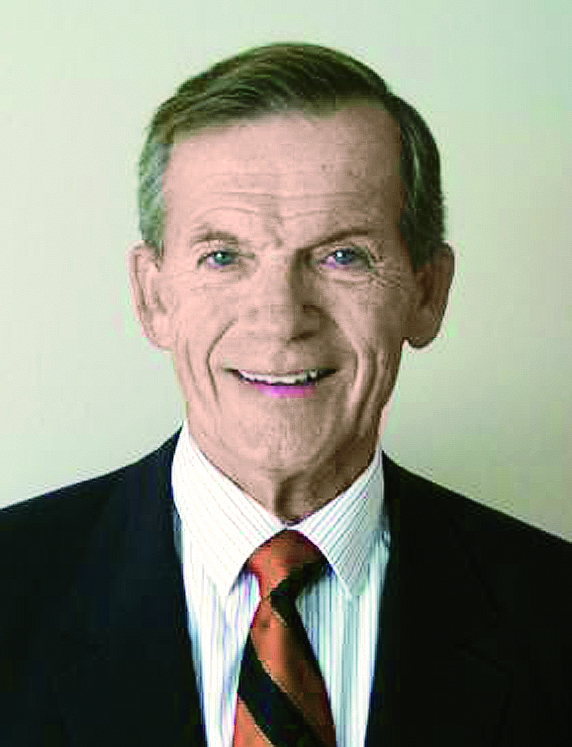
by Mark Smiley | Mar 24, 2017 | Main Articles
By: Larry Ambrose
Raises Funds And Awareness
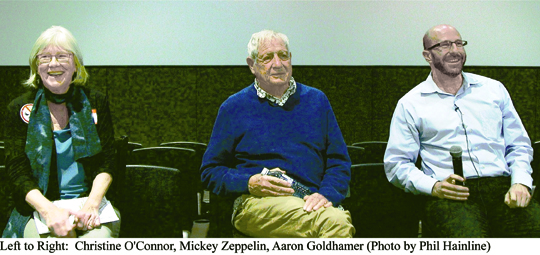 A few months ago on December 7, 2016, more than 100 people attended the showing of the movie Chinatown, at the Sie Film Center, in support of the lawsuit to stop the destruction of historic City Park Golf Course and the Globeville Landing Park. Both parks are part of the Platte to Park Hill Storm Drainage project (P2P) being done to enable expansion, undergrounding and partial cover of I-70 and the massive public/private development of the Platte Valley north of the River North Art District (RiNO).
A few months ago on December 7, 2016, more than 100 people attended the showing of the movie Chinatown, at the Sie Film Center, in support of the lawsuit to stop the destruction of historic City Park Golf Course and the Globeville Landing Park. Both parks are part of the Platte to Park Hill Storm Drainage project (P2P) being done to enable expansion, undergrounding and partial cover of I-70 and the massive public/private development of the Platte Valley north of the River North Art District (RiNO).
The movie, set in 1930s Los Angeles, is really about the sinister development of the then agricultural San Fernando Valley. Jake Giddis (Jack Nicholson) stumbles upon a secret plan to divert water to dry up farm land to buy it cheap and use it for massive commercial and residential development.
The panel discussion that followed featured River North (Taxi) community based developer, Mickey Zeppelin; attorney Aaron Goldhamer; and citizen activist, Christine O’Connor. Zeppelin is gratified by the grassroots momentum building to stop the current plan for I-70 and the further degradation of the Globeville, Swansea and Elyria communities. He pointed out that Giddis, a private detective, tries to fight the evil of municipal corruption by himself without the benefit of community, which results in tragic consequences. Goldhamer outlined the lawsuit against the City of Denver challenging the use of City Park for the non-park use for storm water retention for I-70 and the Platte Valley and asked for community support for the effort. O’Connor outlined the history of the project and how it coincided with the decision to underground I-70 and expand the Stock Show.
Globeville Swansea Elyria: Victim Of I-70, Stepchildren To The Stock Show and River North
In the past decade, the north Denver neighborhood known as RiNo has been transformed from one filled with aging warehouses to an artist community — and the next hot spot for commercial development. Developers like Zeppelin Development and Industry built successful office and mixed-used projects, which attracted more development. See: Denver Post, RiNo project picked by HomeAdvisor for new Denver headquarters is delayed By Tamara Chuang December 19, 2016.
http://www. denverpost. com/2016/12 /19/rino-homeadvisor-denver-headquar ters-delayed/
“Chinatown” Secret Development Plan Or Just A Coincidence: The 2026 Winter Olympics
So, where do the dots connect to a schematic where our government leaders are using a massive public/private partnership to have the the biggest developers and the power elite slop copiously at the public trough? That too, was revealed at the Chinatown event on December 7. Could the Stock Show/I-70/River North be the location of Winter Olympic facilities in Denver and an Olympic Village as part of a bid for the 2026 games? At the end of the panel discussion, NW Denver Councilman Rafael Espinoza, rose to confirm, ”All this is true. I was at a presentation recently where Kelly Leid [now head of development of the “National Western Stock Show Center“] offered up that the planned NWS facilities could be used to accommodate Winter Olympic events.”
The Omnipresence Of Brownstein Hyatt Farber Schreck
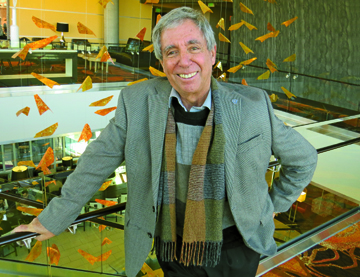
Article Author: Larry Ambrose, above, is a teacher at Metro State Denver and was the former head of INC the umbrella group for Denver neighborhood associations and others until forced out by Mayor Hancock’s administration. He had criticized some of the development projects being pushed by the Mayor’s office which were opposed by many neighborhood groups.
Political and financial influence in Denver has been centered around an elite group of institutional power-brokers and lobbyists. Chief among them is the lawfirm of Brownstein Hyatt Farber Schreck (BHFS) whose principles, Norman Brownstein and Steve Farber, not only have exerted considerable control over Denver’s municipal affairs but who also have been a major lobbying force in Washington, D.C.
BHFS’s connection to John Hickenlooper goes back to the beginning of his Mayoral administration. Cole Finegan had been with BHFS for 10 years and a partner when he was picked to serve as Denver’s City Attorney and Chief of Staff to Hickenlooper in 2003. In January 2015, Governor Hickenlooper hired Doug Friednash from BHFS as his Chief of Staff. A former state lawmaker, Friednash also served as Mayor Hancock’s City Attorney before joining the Brownstein firm.
When shortly after Michael Hancock was first elected Mayor in 2011 and his telephone number was found in copies of phone records as a client of a local prostitution ring, BHFS was retained to manage what was a very touchy situation. Fortunately for the Mayor, the original records were stolen from the home of the head pimp shortly thereafter.
Although associates and clients of Norman Brownstein were at the center of his son Bo Brownstein’s activities, the father escaped untainted. Bo was convicted of insider trading by the SEC, paid a $4. 7 million fine and served a year in prison. Farber is largely credited with bringing the Democratic National Convention to Denver in 2008. Escaping from the crashing financial markets, Steve Farber’s sons Brent and Gregg, investment bankers in New York, moved to Denver in 2008. Their brother, Brad, a lawyer at BHFS, was to join them in the development firm, Elevation Development Group.
What’s The Plan Behind The Plan?
There is a little known but very active plan to bring the 2026 Winter Olympics to Denver. How can it be that by playing a big role in the bigger plan behind the entire Stock Show/I-70/major population relocation and flood control scheme can this group of local politicians and developers stand to profit from the residents of Denver? Connecting the dots between the formation of an Olympics Exploratory Committee in 2011, the Committee’s vote to put in a bid, the US Olympic Committee refusal to submit a bid in 2012, the need for any successful future bid to have City infrastructure for venues and Olympic athlete
housing, the creation of the Northwest Denver Cornerstone Collaborative, obtaining nearly a billion tax dollars, expanding the “Stock Show” development area to 250 acres and creating I-70 at the Stock Show in such a manner as to serve as a covered transportation station (ala Union Station) to the mountains and, voilá, you have quite an Olympic venue.
Colorado Voters Rebuke 1976 Winter Olympics: Cause For Caution?
In 1976, Colorado voters rejected the Winter Olympics even after being chosen as the site by the US and International Olympic Committees. Although Hickenlooper and Hancock have not exactly hidden the effort to bid on the Winter Olympics again, it cannot be seen as an open and transparent process. One could describe the ongoing attempt to bring the games to Colorado as very low-key. But neither have our civic leaders involved revealed the connection to the North Platte Valley, keeping I-70 in place or the NWDCC and the Stock Show.
Olympics even after being chosen as the site by the US and International Olympic Committees. Although Hickenlooper and Hancock have not exactly hidden the effort to bid on the Winter Olympics again, it cannot be seen as an open and transparent process. One could describe the ongoing attempt to bring the games to Colorado as very low-key. But neither have our civic leaders involved revealed the connection to the North Platte Valley, keeping I-70 in place or the NWDCC and the Stock Show.
Denver Bids For The 2022 Winter Olympics
Created by Mayor Hancock, and Governor Hickenlooper, the Denver Olympic Bid Exploratory Committee featured such notable players as Steve Farber and Cole Finnegan as well as other downtown Denver operatives with ties to the Mayor and Governor, including: Tami Door, Kelly Brough, Elbra Wedgeworth, Richard Scharf and Anne Warhover. See: The Colorado Independent, Denver, Colorado, form official exploratory committee for 2022 Winter Olympics David O. Williams December 16, 2011.
http://www. coloradoindependent. com /108152/denver-colorado-form-official-exploratory-committee-for-2022-winter-olympics
The Recommendations in 2012 from the Operations Committee of the Exploratory Committee contains the following:
Colorado also starts in a strong position as it relates to the structural components necessary to bidding and hosting the Winter Games . . . . . . . For non-competition venues, there are seven total structures required. Of these, only the city and mountain athlete villages will require permanent construction. While these facilities will likely require some public financing to construct, they all represent opportunities for long-term legacy use. Examples of how other Olympic host cities have turned facilities into legacy opportunities include the Oval Vancouver constructed in 2010. This facility now serves as multi-use facility for the city and surrounding communities. Also, to accommodate the International Broadcast Center and Main Press Center, Vancouver 2010 expanded the existing convention center to triple its previous size . . . . . . . Additionally, Olympic villages can be used to showcase cutting edge design and construction techniques as well as to fulfill vital affordable housing needs after the Games are completed. See: The Denver Olympic Exploratory Committee Endorsement of the 2022 Winter Olympics June 27, 2012.
https://www. scribd.com/document/ 98553430/Denver-Olympic-Exploratory-Committee-Endorsement-of-2022-bid? ad_group=Online+Tracking+Link&cam paign=Skimbit%2C+Ltd.&content=10079 &irgwc=1&keyword=ft500noi&medium= affiliate&source=impactradius
In 2012, after due consideration the Exploratory Committee officially voted unanimously to put in a bid for 2022. No surprise there! Hancock and Hickenlooper sent out a joint statement:
“We want to thank the Denver Olympic Exploratory Committee for their thorough, objective work to evaluate a potential Olympic bid. It is great news to learn about the Committee’s unanimous support of a bid and we deeply appreciate the research and expertise offered in the report. We will take due consideration of the report, which will inform our decisions on next steps. ”
What Happened To The Bid For 2022?
However, not long after, in July 2012, the US Olympic Committee (USOC) dashed Denver’s hopes of bidding for the 2022 Winter Games by announcing it would sit out the competition. Denver’s Exploratory Committee was disbanded, with the intention of reviving the effort for a bid in 2019 for the 2026 games. Exploratory Committee member and 12-time Paralympic gold medalist Sarah Will of Edwards said, ”whether it’s 2026, 2030 or beyond, the Winter Olympics ultimately should be held in Colorado.” See VailDaily, An Olympic bid in 2026? David O. Williams February 14, 2014.
http://www.vaildaily.com/news/an-olympic-bid-in-2026/
Bill Marolt, champion Colorado skier, US Snowboard Assn. President and CEO and a member of the USOC Board, thinks Denver should bid. “I believe that the USOC and IOC are going to look for the best opportunities and their viable candidates, and I think Denver’s a viable candidate.”
However, Denver faced stiff competition in 2012 for the 2022 games from joint Olympic bidders in Reno-Lake Tahoe. Detrimental to a successful bid from Denver would be serious questions about infrastructure, facilities in the City and, of course, upgrading I-70.
Hancock And Hickenlooper: Enhancing Denver’s Chances For 2026
So in January 2013, the Mayor announced a major, ”envisioning” effort to “revitalize,” 3000 acres and the neighborhoods of Globeville, Swansea and Elyria and appointed Robert Moses of Denver, Kelly Leid, a protege of Oakwood Homes developer, and major supporter of Hancock, Pat Hamill, to head it up. Almost $1 billion dollars was approved for infrastructure and improvements for the “Stock Show.” See: Presentation North Denver Cornerstone Collaborative, Six Projects — One Vision by Kelly Leid August, 2015.
http://www.denverleadership.org/ wp-content/uploads/2015/08/Leid-Kelly.pdf
About the same time, in 2012, Hickenlooper ordered CDOT to study undergrounding I-70 through the Stock Show area in order to build a $2 billion partial cover over the freeway to connect the Stock Show area to the Coliseum and RiNO. As plans for both massive infrastructure projects progressed, it became clear that storm run-off flooding would put a “damper “ on all of these projects. Thus was born the Inter-Governmental Agreement between the City and CDOT to charge the citizens of Denver more than $400 million to enable the “vision.”
Do the residents of Globeville, Swansea and Elyria feel like all of this money and these projects are at all directed to “revitalize” their communities? Most do not. But what then could this $3. 5 billion plus plan be all about? Few seemed to notice when Jon Murray, city beat reporter for The Denver Post on June 22, 2016, wrote an article with the following headline. “Colorado group seeks lessons from Rio for potential Olympics bid: Delegation includes Denver Mayor Michael Hancock and Colorado Gov. John Hickenlooper.”
Murray goes on to report, “Asked about a potential Denver bid for the winter Olympics, Hancock spokeswoman Jenna Espinoza sent this statement:
“Denver has made no secret of the fact that we are interested in pursuing the Winter Olympic Games, if the opportunity presented itself. Every city we visit, we learn from the challenges and opportunities of the area. From this discussion with the Rio host committee, we expect to learn from their bid process, and overall, hear about their approaches to event hosting.” See: “Colorado group seeks lessons from Rio for potential Olympics bid: Delegation includes Denver Mayor Michael Hancock and Colorado Gov. John Hickenlooper,” Jon Murray Denver Post, June 22, 2016.
Is it just a coincidence that in 2015 Steve Farber’s sons, Elevation Development, purchased a full square block of land on the southern edge of the Stock Show’s new development boundaries? With a $10 million land deal closed, a Denver developer is firing up another major RiNo project. Elevation Development Group bought 2. 5 acres near Downing and Blake streets last month for $9.6 million. Principal Brent Farber declined to comment on specifics but said the company plans to break ground on a significant mixed-use development in 2016. “There’s a big story happening in RiNo right now, there’s a lot going on in the area,” he said. ”One thing I loved about this specific site is it’s right on the light rail stop — it ‘s just right off of the platform.” Elevation’s purchase includes the entire block bounded by 36th, Blake, Downing and Walnut streets and a separate parcel at the northeast corner of Downing and Walnut. Elevation Development, acting as Hub Development LLC, closed the deal on Sept. 17, city records show. See: BusinessDen With mixed-use plans developer buys RiNo lot for $9. 6M Burl Rolett October 1, 2015.
http://www.businessden.com/2015/ 10/01/with-mixed-use-plans-developer-buys-rino-lot-for-9-6m/
Be Here Then, Be Here Now
If only we had paid attention to Denver’s most astute observer, artist and prophet, Kenny Be, way back in 2009. He knew this was coming and even came up with a mascot!

by Mark Smiley | Mar 24, 2017 | Main Articles
City’s Refusal To Plan For Traffic And Parking Causing Crisis
Bed Bath & Beyond Leaving. Elway’s Next?
by Megan Carthel
 Creek Cherry was named in the 19th century for chokecherry bushes that once lined its banks. While attractive flowers bloom from the bush, if you eat the leaves or seeds you would choke and go into convulsions.
Creek Cherry was named in the 19th century for chokecherry bushes that once lined its banks. While attractive flowers bloom from the bush, if you eat the leaves or seeds you would choke and go into convulsions.
Denver’s adamant refusal to consider traffic and parking concerns in approving new developments in the area is slowly choking and destroying the retail businesses at the Cherry Creek Shopping Center and in Cherry Creek North according to experts.
When District Court Judge Shelly I. Gilman was told in a lawsuit on a zoning dispute for a new development that the City does not and will not consider traffic and parking concerns in approving new developments, she was incredulous. “That can’t be true,” she exclaimed. When the City sheepishly confirmed that it was, in fact true, Judge Gilman was still incredulous, stating that if you didn’t consider traffic and parking impacts, what did the Denver Community Planning and Planning Department and the City Council plan for?
City Reduced Parking For New Developments
Denver significantly reduced parking requirements for apartments and condominiums to a fraction of those required in other cities.
Former City Councilman Ed Thomas explained, “If they actually did consider traffic and parking impacts some projects would h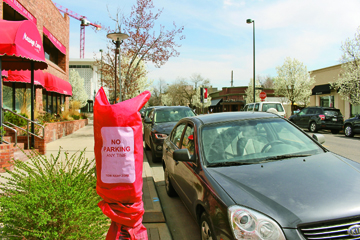 ave to be modified or even not approved and real estate developers simply don’t like that.”
ave to be modified or even not approved and real estate developers simply don’t like that.”
In January 2017, of this year, the Shopping Center was forced to introduce paid parking which The Denver Post stated in its headline as “a total disaster.” Channels 4 and 7 ran similar stories saying that shop owners reported that it was “killing business.”
Major Cherry Creek Shopping Center retailer Bed Bath & Beyond announced it was moving to Glendale this fall. There are unconfirmed rumors that Elway’s restaurant, a well-known gathering place in the center, was going to close and move to the old Cool River Café location at 8000 East Belleview in Greenwood Village.
Restaurants At The Mall
Scott Stevens, owner of Which Wich, said the move has severely hurt his business.
“The impact on my business has been horrendous. Food business in a mall is highly dependent on traffic in a mall. We are down 40 percent consistently versus a year ago, week after week after week. Which 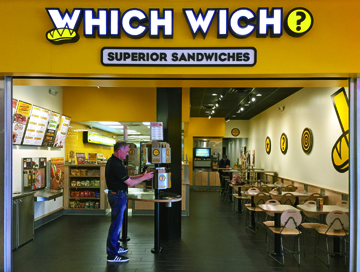 says to me the traffic in the mall is down 40 percent.”
says to me the traffic in the mall is down 40 percent.”
While Stevens’ restaurant is a fast-food joint inside the mall, he said it’s still beneficial for him to have foot traffic the mall is now lacking. Signing his 10-year lease just over a year ago, Stevens said the mall management was not upfront about making the switch to paid parking.
“Had I known they were going to start charging for parking this year, I would’ve thought twice about [having my store in the Cherry Creek Shopping Center].”
Nick Gourian of Fresh Healthy Café told Channel 7 that its business was down nearly 40 percent in March and he wrote a letter to Governor John Hickenlooper and Mayor Michael Hancock to complain about the imposition of paid parking.
Some businesses at the Shopping Center are taking proactive measures. Jennifer Olson, General Manager of Brio Tuscan Grille stated to the Chronicle, “We’ve been telling everyone eat, chat, and we will validate. Come on in and eat and drink for up to three hours and we take care of the parking fees.”
But Why?
In almost none of the articles and stories about paid parking at the Shopping Center is it truly explained why the Shopping Center would adopt a policy that has such disastrous consequences for its tenants.
The answer is simple. The City gave the Cherry Creek Shopping Center no choice in the matter. Not by any kind of direct governmental edict but by approving scores of projects in Cherry Creek North with limited or vastly inadequate parking. The Cherry Creek Chamber at an annual luncheon several years ago disputed the claim that there was inadequate parking in Cherry Creek North, declaring, inter alia, that there were 5,100 free parking places at the Cherry Creek Mall.
The Cherry Creek Shopping Center found itself flooded with cars from new hotels, apartment houses and condominium complexes with minimal parking. Moreover employers at retail and other businesses instructed their employees to also park at the center.
Nick LeMasters, Cherry Creek Shopping Center General Manager, said, “Customers have always parked at the mall and in Cherry Creek North and crossed First Avenue and have cross-shopped and that has never ever been discouraged or has never presented itself as a problem.” LeMasters added, “The challenge has been the fact that we have employees, not just from Cherry Creek North, but employees primarily in the service industries and hospitality and the retail industries who have viewed us, perhaps appropriately, as the free parking option because there’s very little complimentary parking around the neighborhood.”
Cherry Creek North
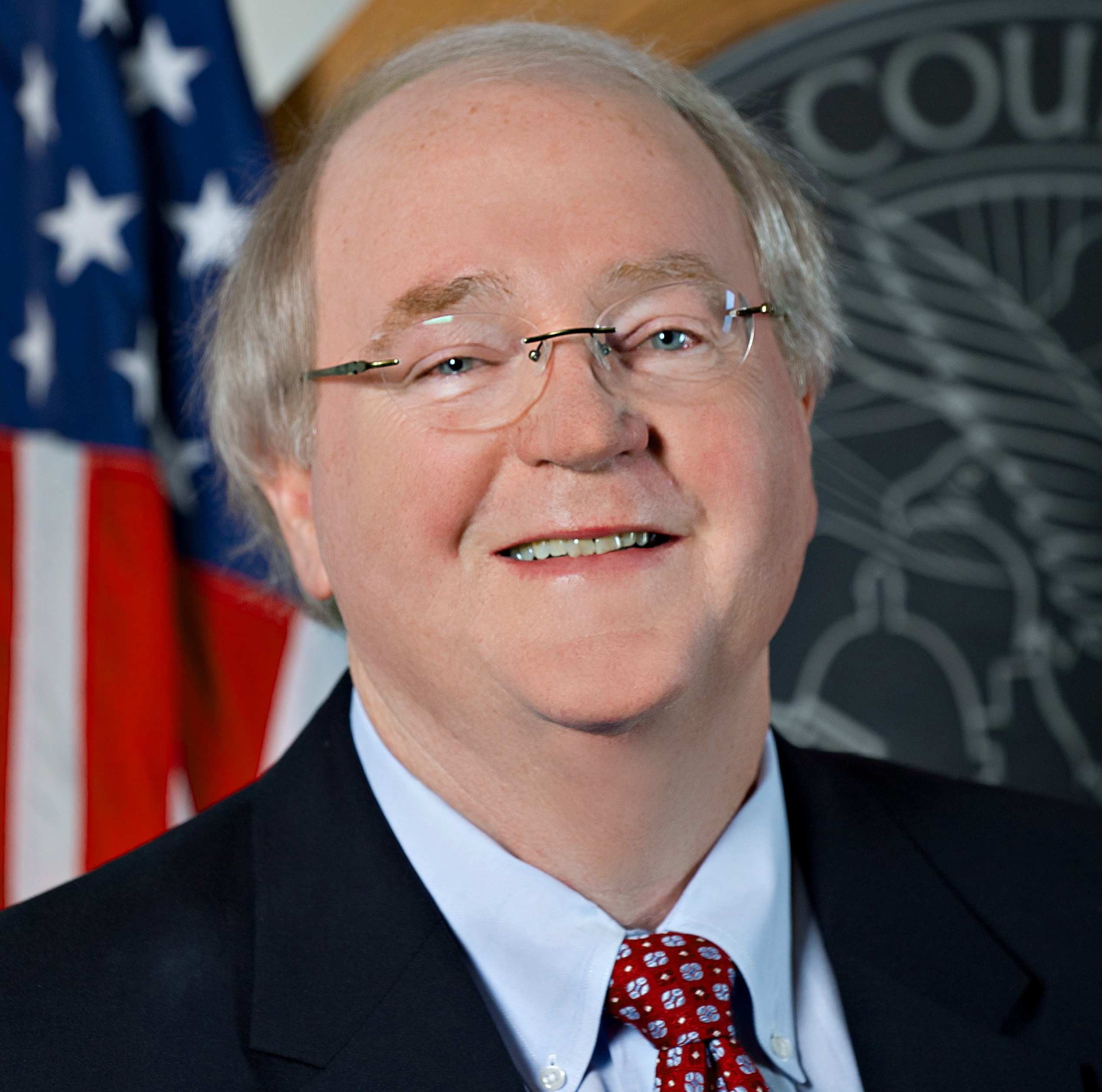
Councilman Wayne New
Wayne New, District 10 City Councilman, who won his seat in part for his willingness to take on the City and developers on planning issues, called the present situation a “perfect parking storm” not only for the Cherry Creek Shopping Center but also Cherry Creek North.
Gavin Berry, General Manager of Del Frisco’s Grille at 100 St. Paul Street, is feeling the effects. Del Frisco’s is an upscale eatery in Cherry Creek North that has seen a drop in its customer base since the transition to paid parking.
“We’ve definitely seen less traffic than we did this time last year. The sentiment is that fewer folks are coming into Cherry Creek,” Berry said.
Berry noted he’s seen about a 20 percent decrease in traffic. “If less people are coming into Cherry Creek, less people are dining in Cherry Creek and less people are shopping in Cherry Creek,” Berry said.
Aimeé Noel, Pea in a Pod store manager in Cherry Creek North, said it’s too early to tell if there has been an impact on her business but suspects there might be an effect on the area.
“I would definitely think (the  paid parking system) would have an effect on the overall area,” Noel said. She did say that she has heard complaints from customers.
paid parking system) would have an effect on the overall area,” Noel said. She did say that she has heard complaints from customers.
But Why Again?
Why would the City and County of Denver want to destroy one of its vibrant retail business areas which provides the City an estimated $10 million in sales tax revenues?
A key lobbyist in Denver revealed (not for attribution): “They just don’t care. Restaurants and retail stores do not fund political races. They do not provide future lucrative contracts or jobs for term limited politicians after they get out of office, but real estate developers can. The City also hopes that with all the new Cherry Creek area residents, some of them will not be able to have cars because there will be no place to park them, will shop in Cherry Creek and make up for the fact that no one outside of Cherry Creek will ever come back to Cherry Creek to shop again.
“Moreover if that doesn’t work and retail shopping is destroyed in the Cherry Creek area because traffic and lack of parking it is irrelevant from a financial standpoint. Denver is both a city and its own county so it gets the lion’s share of all property taxes. The money from property taxes for all the new buildings in Cherry Creek more than offsets all the retail sales taxes that will be lost. If the Shopping Center and retail shops in Cherry Creek North cared about surviving they should have bought themselves a mayor and a planning director like the real estate developers did.”
Prior to winning his council seat Wayne New was involved in various lawsuits against the City and its Planning Department for failing to require parking or traffic studies or forecasting models. Led by New, the Cherry Creek North Neighborhood Association* hired its own traffic firm, TDA Colorado, who looked at future traffic and parking needs which showed that thousands of additional parking places would be needed and Third Avenue reconfigured at a minimum to handle significantly increased traffic.
If there is any silver lining, New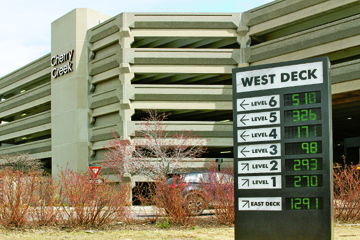 notes that some of the newer developments are putting in parking significantly well above what is being required by the City.
notes that some of the newer developments are putting in parking significantly well above what is being required by the City.
But Cherry Creek Shopping Center’s Nick LeMasters is not sanguine, “The development that’s going on around us, there’s no end in sight and there’s multiple projects coming out of the ground as we speak and several more that are imminent that will soon happen, and [paid parking] was a defensive move on [the Shopping Center’s] part.”
Most of the chokecherry bushes have disappeared from Cherry Creek and retail stores may face the same fate in the relatively near future.
* The Chronicle originally reported that the Cherry Creek North BID hired TDA Colorado to conduct a traffic study. It was in fact the Cherry Creek North Neighborhood Association who hired the firm.
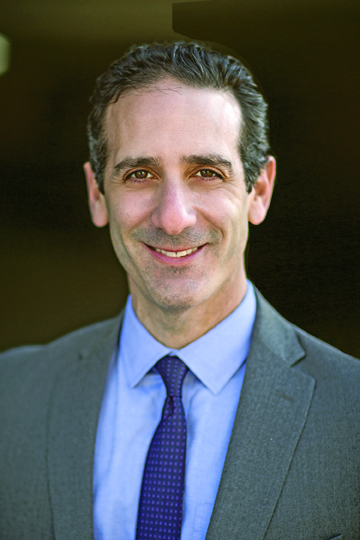
by Mark Smiley | Mar 24, 2017 | Feature Story Bottom Left
The 11th Commandment: ‘Thou Shall Turn Off Thy Cell Phone’
by Danny Foster, Esq.
One of the rites of passage for most Jewish teenagers is when they become Bar Mitzvah (boy) or Bat Mitzvah (girl). It’s a formal entry into adulthood in the Jewish community, even if the teenager is only 13-years-old. I guess way back in the old days 13-years-old was already a proper age to get married and start a family, so adulthood made sense. In Colorado, and the rest of the United States, you are not considered adult until age 18; that’s when the stupid actions of youth become adult criminal behavior with life-long repercussions. In some circumstances a teenager under the age of 18 can actually be prosecuted as an adult if the crime is particularly violent. But this isn’t an article about the juvenile criminal justice system, it’s about my daughter’s Bat Mitzvah which occurred in February right here in Denver at Temple Emanuel.
Along with the teenager’s studying, stressing and celebration (can you say Lox, bagels and a great DJ?), the parents also undergo their own rite of passage, which is giving a small talk to their child in front of the congregation. I usually do not relish the spotlight (yeah right!) but I was particularly excited to talk to my daughter and let her know that I was proud of her, that I loved her very much, and as my parental piece of advice I urged her and her friends, siblings and cousins to do us all a favor and power off their iPhones once in a while. Yes, my Bat Mitzvah talk was about re-connecting with the real world and to stop being a robot to the iPhone. No meaningful connections happen on Snapchat, Facebook or Twitter. Face-to-face communication is a lost art form and it is dooming their generation to becoming senseless drones. I challenged Lucy and her friends/siblings/cousins to make a meaningful attempt to pick one day a week where they simply unplug. It is, after all, possible to do that. In my house we have a rule, whoever rides shotgun in the car may not be on their phone at all. It’s a small step, but I honestly fear my children won’t be able to navigate their way around Denver because they haven’t been watching the scenery while we drive. Insanity!
Another more important issue about this generation and technology is the real legal trouble they are getting into, often unwittingly, due to their over active iPhone addiction. Our law firm has represented too many adolescents and teenagers who have faced significant legal problems as a result of things they posted or looked at. Criminal behavior that was unthinkable 10 years ago. Did you know that if a minor sends your child a picture of them naked, then YOUR child can be guilty of possessing child pornography? Even if they didn’t request the pictures. And guess who else could be in trouble? How about the person who owns the phone (yes, YOU parents!).
It’s a brave new world. Due to these issues and many other land mines associated with modern-day adolescence and teenage life our law firm has for several years conducted seminars at high schools to discuss these issues face to face with the students. A few years ago we expanded our seminar program and created “Get Ready for High School Boot Camp” for all students grade 8-11 AND their parents. We try to give some useful advice about drugs/ alcohol, sext-ing, Internet bullying and other crimes, and hopefully enable parents and children to begin the difficult dialogue on very tricky, complicated issues that are incredibly important.
Our law firm invites you to attend on April 25 or April 26 from 6-8 p.m. Or April 27 from 6-8 for high school seniors heading into college. There is no charge, the only requirement is that the child must attend with at least one parent/guardian. The seminar is capped at 100 total people per night, so if interested book ASAP. The link to register is www.FosterGraham.com /bootcamp. (In the event this fills up and you are unable to get into the seminar, make sure to go to FosterGraham.com and sign up for our quarterly newsletter and you will be the first to learn about upcoming seminars and other legal hot topics.)
While I cannot promise Lox and bagels at this seminar we can promise you will walk away with something much more valuable. And while my daughter was embarrassed that I called her technology use out at her Bat Mitzvah, I saw a whole lot of parents nodding their heads in agreement. Many of them came up to me afterwards and thanked me for saying exactly what needed to be said. It’s time that we as parents took back control and had our kids tune into the greatest reality show on the planet…. it’s called LIFE and the wi-fi is always free and there’s no chance of running over on your data plan!
Danny is a managing partner of Foster, Graham, Milstein & Calisher (FGMC). His practice focuses on personal injury. The law firm of FGMC, located in Cherry Creek, is a full service law firm focusing on: criminal defense, personal injury, real estate, litigation, liquor licensing, construction law, tax/estate planning, bankruptcy and zoning. This article does not create an attorney-client relationship and is for informational use only (what do you expect from an attorney!)

 A few months ago on December 7, 2016, more than 100 people attended the showing of the movie Chinatown, at the Sie Film Center, in support of the lawsuit to stop the destruction of historic City Park Golf Course and the Globeville Landing Park. Both parks are part of the Platte to Park Hill Storm Drainage project (P2P) being done to enable expansion, undergrounding and partial cover of I-70 and the massive public/private development of the Platte Valley north of the River North Art District (RiNO).
A few months ago on December 7, 2016, more than 100 people attended the showing of the movie Chinatown, at the Sie Film Center, in support of the lawsuit to stop the destruction of historic City Park Golf Course and the Globeville Landing Park. Both parks are part of the Platte to Park Hill Storm Drainage project (P2P) being done to enable expansion, undergrounding and partial cover of I-70 and the massive public/private development of the Platte Valley north of the River North Art District (RiNO).
 Olympics even after being chosen as the site by the US and International Olympic Committees. Although Hickenlooper and Hancock have not exactly hidden the effort to bid on the Winter Olympics again, it cannot be seen as an open and transparent process. One could describe the ongoing attempt to bring the games to Colorado as very low-key. But neither have our civic leaders involved revealed the connection to the North Platte Valley, keeping I-70 in place or the NWDCC and the Stock Show.
Olympics even after being chosen as the site by the US and International Olympic Committees. Although Hickenlooper and Hancock have not exactly hidden the effort to bid on the Winter Olympics again, it cannot be seen as an open and transparent process. One could describe the ongoing attempt to bring the games to Colorado as very low-key. But neither have our civic leaders involved revealed the connection to the North Platte Valley, keeping I-70 in place or the NWDCC and the Stock Show.

